The Game of Love and Death (23 page)
Read The Game of Love and Death Online
Authors: Martha Brockenbrough

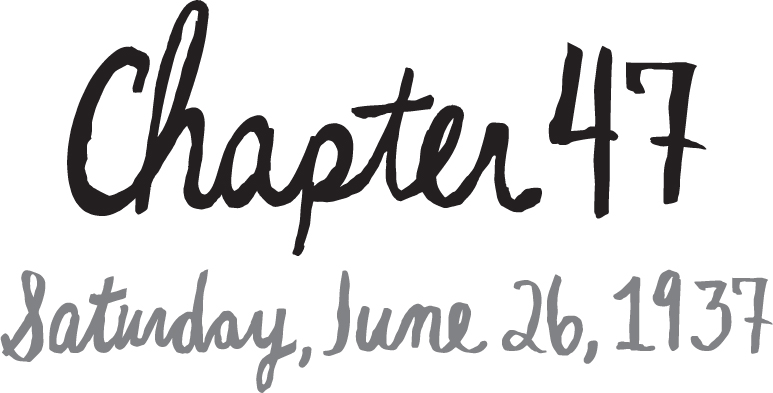
D
EATH
wished she needed to sleep. How fortunate humans were, to spend a third of their lives unaware. She never had a moment to forget who she was. Never a moment to pretend she was anything but a scourge. It felt better to glean souls as she did it. But then afterward, the pain, the hunger for more, was worse.
Death wrapped herself in a silk robe. She inserted her pale, soft feet into slippers. Surely Ethan was asleep. Surely she could be quiet enough…
She blinked and rematerialized in his room, not wanting to chance that someone else in the house was awake. His breathing was slow and warm and even. Through a gap in his curtains, light from the nearly full moon seeped in. She inched toward him. He lay on his back, one arm flung over his head while the other clutched his sheets, his skin indigo in moonlight. She knew exactly how his life would taste. She leaned in and inhaled his skin. His heat warmed her lips. She willed him to remain still. And then she whispered soft things into his ear, words to shape his dreams.
When morning came, he would rise full of urgent desire. Not for Love, but for what Love kept tucked in a pocket over his heart. The book. The book and its secrets. In its pages, Ethan would learn he was a pawn, and that Henry was in even more danger. However he dealt with that information, she’d have the advantage. And all of it was in accordance with the rules.
In another blink, Death was back in Helen’s room. Numb. Alone. Waiting for the light of day to wash over her.
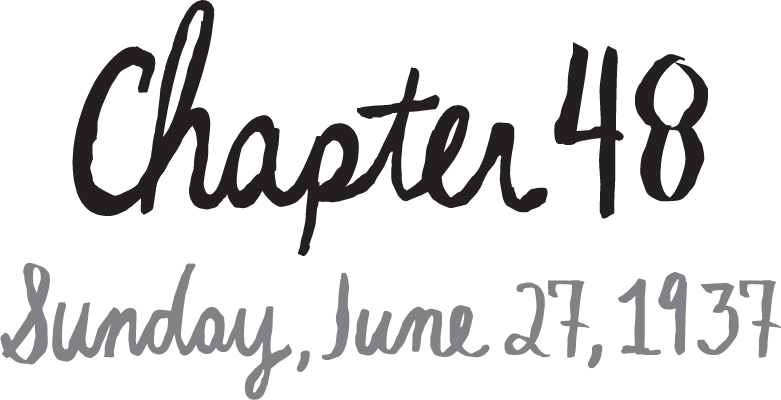
E
THAN
gasped himself awake, sweaty and shaking. It was too early even for birds. He heard nothing but his own rushing blood. His dream had felt like a murky pond with something vital beneath its surface. The edges of the memory felt just beyond his fingertips. Something about a book. A book, open in James’s hand. A book in which James was writing.
Ethan sat up.
What did James write in his little book?
He swung his legs over the edge of the bed. His pulse was everywhere: in his ears, in his hands, boiling beneath his skin. If the book contained stories about what they’d done, if it listed his name … Ethan threw open the window. Somewhere in the distance, a bird opened its beak and sang a few lonely notes.
The book contained Ethan’s ruin. He knew it as surely as he knew the feeling of a line drive hitting his glove. It made him wish not for death but for something beyond, to have his existence erased so thoroughly that it would not even echo in memory.
Someone knocked. He stood still. Please let whomever it was think him asleep.
“Knock knock.” Helen opened the door.
She was dressed for the day already in a red frock with black polka dots, and she carried a tray of breakfast offerings. Coffee. Buttered toast. A wedge of flesh-colored melon. Juice from a fresh-squeezed blood orange.
“What’s all this?” Ethan sneered at her to hide his worry.
“I had an inkling you’d be up,” she said. “Can’t a girl bring her favorite cousin breakfast?”
Ethan sat on the deep windowsill. “Henry isn’t here anymore.”
“You and your self-loathing. Besides, Henry and I aren’t blood cousins,” she said. “Careful there. You might fall out the window.”
“Yes, and then who would you have to torment?” It was a rude remark, but he couldn’t summon the grace to apologize. Instead, he slid off the sill and picked up the toast, smearing it with jam. “Thank you for breakfast.”
“My pleasure. Let’s spend time together soon, all right?” She smiled as she left the room, her dress swishing around her calves.
Ethan ate in silence. There was something he had to do. He just had to figure out when.
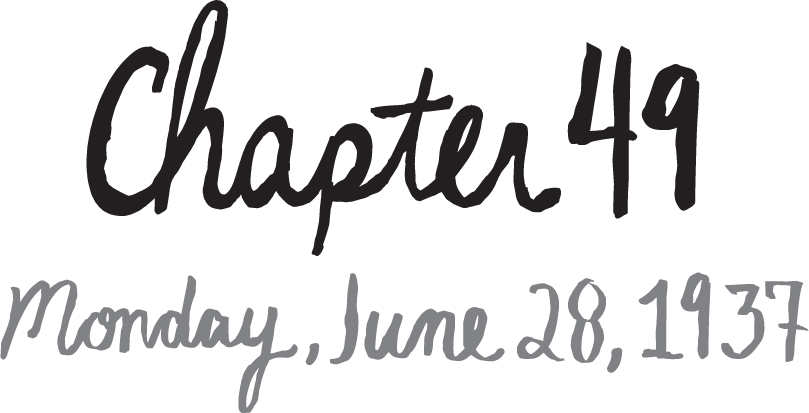
D
EATH
sat at a rolltop desk in Helen’s room. A sheet of creamy stationery lay on a red blotter, by a bottle of ink and a fine fountain pen. She closed her eyes, willing the tears to rise. One was almost certainly enough. But to ensure the job was thorough, she produced three. These, she transferred to the bottle with a trembling fingertip. The tremor — that was new. No doubt a sign of strain. This Game, unlike the rest, felt slippery, a fish pulled with a bare hand out of a swift and frigid river.
The tears hissed as they fell into the bottle. And there was an odor: sharp, tinged with decay. The blank page before her contained infinite possibilities. But not for long. The moment she set the pen to the flesh of the page, certainty would return. Certainty. It was her kingdom.
She dipped the pen. Her fingers shook again — damn them. A spot of ink made a fierce little shape on the page. She rocked the blotter against the wayward ink. She’d gotten ink in the space between her second and third fingers too. And on her dress, another drop. The lack of control it indicated thrilled her, as if in this body she’d finally become someone else, someone unpredictable.
She did not wad up the page, but put her pen to it again. The words flowed.
Scandalous. Reckless music. Dangerous mixing of the races. Not what God intended.
She would send this letter to the editor of the newspaper — Ethan’s father, Henry’s employer. It would reach the eyes and hearts of concerned citizens, moving them to close the Majestic, to end the spectacle of a white boy singing a love song to a dark-skinned girl. Flora and Henry would lose it all: their livelihood, their hope, their friends. Their love would die. Flora would run from him. Or, more likely, fly.
It was a shame, really. Most humans laid waste their hours to the superficial, to the transitory. Great oceans of passion poured over smoke, while the actual fire burned elsewhere. Henry was one of the rare men with a firm grasp on the important. She set down the pen and blew on the glistening ink. Ah, well.
She sealed the letter in an envelope and sensed a presence behind her. Annabel.
“What are you doing?” the girl asked.
“Writing a letter.” She showed Annabel the envelope. “Would you like to learn how to send one?”
“Yes,” Annabel said. She set down her doll. “Yes, I would.”
Death taught her.
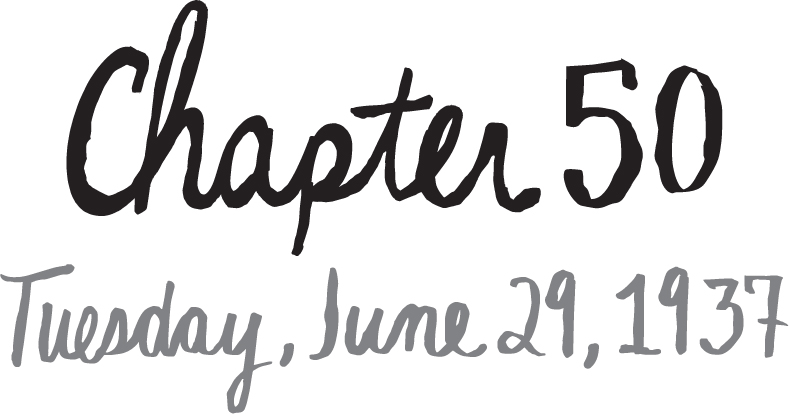
W
ITH
the money from his first paycheck, Henry had moved into a boarding house on Capitol Hill. The room was simple, in an old Victorian run by a tiny tyrant named Mrs. Kosinski. Henry shared a bathroom with eight other residents, but the room itself was his own and infinitely better than Hooverville. It came furnished with a bureau, a twin bed, and a narrow closet. His bass was the most beautiful thing about the place, kept by the west-facing window where the light would grace it during the late-afternoon gap between work at the printing press and performing.
His new life felt full and right. Flora’s band had picked up other gigs here and there. But it was their opening act at the Majestic that shined. The crowd loved “Someday,” as Flora’s uncle had predicted. It had become a duet featuring the two of them.
Ever since Henry had moved into the boarding house, Ethan had been stopping by every afternoon for help with his article about Hooverville. Something was amiss; Henry could tell. Since graduation, Ethan had lost weight, and he looked exhausted. Henry had asked Ethan once or twice what was the matter, but Ethan waved him off. For certain, though, the Hooverville story was part of it.
“Father’s going to blow a gasket at this, isn’t he?” Ethan lay on the bed and looked at the ceiling.
“It’s true, right? You’ve managed to take some notes documenting everything?”
“Yes, but I also know these facts inside and out.” Ethan rubbed his eyes and yawned. “Would you read me that last part again?”
“Certainly.” Henry cleared his throat.
“ ‘Hooverville is the abode of the forgotten man. By this journalist’s count, six hundred thirty-nine live here, each one with a story worth hearing — far too many to include in these humble columns. They are the modern melting pot, counting among their ranks Filipinos, Scandinavians, Africans, Mexicans, Indians, South Americans, and Japanese, along with Caucasians who fell down on their luck during the Crash of ’29.
“ ‘Some men had wives and children. Some owned homes. Some worked as laborers and craftsmen. Others helped tame the forests surrounding the city, providing the lumber for houses and businesses. Others still were maimed in the Great War and cannot work. They have come together in shabby camaraderie to form an ethnic rainbow, dreaming not of a pot of gold at the end, but a pot of soup and respectable employment.
“ ‘It is not so different, really, than what any man wants. Respectability, repast, and a roof over his head. Or so says James Booth, a charismatic and handsome twenty-year-old fellow who calls himself the mayor of Hooverville.
“ ‘ “If people could see us for who we were,” Mr. Booth said, “the better angels of their nature would respond.” ’ ”
Ethan sat up. “That bit,” he said, “was it too much?”
“The part about James being handsome and charismatic?” Henry said. “You could perhaps leave that out.”
Ethan’s expression shifted and Henry stopped himself. In that instant, he understood something. Something that made his stomach fall, though not with horror, as it might have before he and Flora had found each other. The feeling was sadness and compassion. It made Henry want to confide his own secret to Ethan, to let this person who was like a brother to him know that he understood. But he could not betray Flora in the process. Even if she had not consented to be with him, not yet, their bond felt sacred, secret.
The situation worried Henry. Ethan would soon be occupied with college. Henry, who had not graduated from high school, would not be able to help. These secrets, this distance … the natural thing might be to drift apart.
But he would fight that.
“Never mind,” he said. “It’s good. It’s the truth. What does the Bible say about truth?
Veritas vos liberabit
?”
“The truth shall set you free,” Ethan said, looking out the window. “The older I get, the more I hope it’s true, but the less I believe it.”
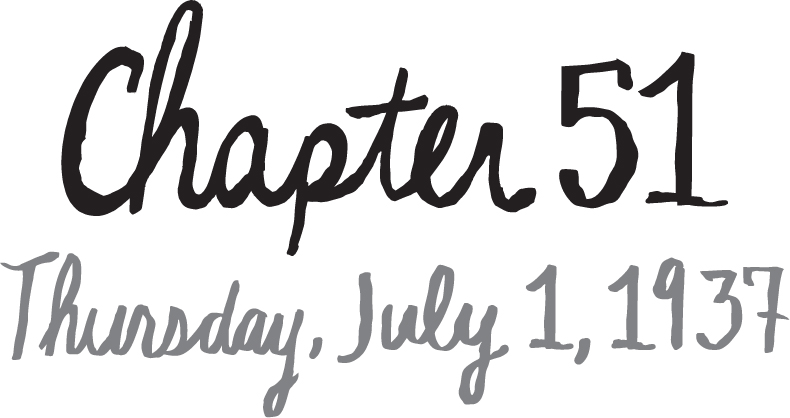
P
ROTESTORS
stood in front of the Majestic carrying pieces of painted cardboard.
YOU
CAN’T
SPELL
SINGER
WITHOUT
SIN
.
MISCEGUNATION:
AGAINST
GODS
PLAN
FOR
MAN
.
Flora hated walking past them on her way into the club, hated the way they’d block the sidewalk and make her step around them, hated their bad spelling and punctuation. The worst of them hissed and spit at her. As Flora arrived, a car carrying even more pulled up. The passengers, four large white men, reeked of trouble.
Inside, Doc’s wife, Glo, was painting the window trim.
“Don’t mind them,” she said when she saw Flora’s expression. “You’d think they’d find something better to do with their days.” She stepped back to inspect her work. “In my opinion, anyone who claims to speak for God is probably talking out of the wrong end, anyway.”
Flora laughed. “Amen.”
Glo dipped her brush. “It’s a good problem if it can be fixed with a bit of paint, and even better if I can get it done with a snifter of gin. I’ve been wanting to spruce this place up for years. Thanks to the business you’re bringing in, I can.”
Flora didn’t have a chance to respond before shadows filled the window. She shoved Glo out of the way. There was a burst of breaking glass as something hard sailed through the window. A car squealed off.
They lay on the floor a moment, panting. When it felt safe, Flora looked up. A newspaper-wrapped brick lay inches away.
“Oh, Glo,” she said.
Glo was on her knees. “My windows, my beautiful windows. And oh, Lord, no. The paint is all over the floor.” A puddle of it spread across the linoleum, mixing with shards of glass.
Flora fetched rags and mopped up as much paint and glass as she could. “Turpentine might help. Do you have any?”
“Doc’s got that in the back,” Glo said. “I’ll fetch it.” She knocked back the rest of her gin.
Flora wiped up the bulk of the paint. She folded the rags over on each other until the mess had been contained inside, and she dropped the bundle in the trash. Then, fingertips sticky, she bent to pick up the brick. She untied the string and unwrapped the paper, a letter to the editor about the music they’d been performing. The writer called their show a crime against humanity, a sign of moral decay, and any number of things that twisted Flora’s insides. The voice of the letter, which had been signed
A Concerned Citizen
, felt like a living creature in her mind, a sharp-toothed shrew, a gnawing rat.
She spread the newsprint on the ground and used it to wipe the rest of the paint off of her hands. It was somehow worse that Henry’s own people had published it, that Henry’s hands had been on the press that joined ink and page. Surely he’d seen it. Surely he would lose his job if he continued playing. And then how would he pay his rent — especially if the city shut down the Majestic next?
“What is it, baby?” Glo returned with Doc, who carried turpentine and more rags.
“Nothing,” Flora said, wadding the paper.
“Don’t seem like that.”
“It’s a letter to the editor. Stupid and vile. Nothing worth thinking about, Glo. Really.”
As Glo swept the glass, Flora went outside with the brick, halfway wishing whoever had thrown it had stayed around. She wanted to toss it back. See how he liked it. She checked her watch. The set would start in a few hours. But it would have to be without Henry.
She’d send word, or better, let him know in person. It had been foolish to let down her guard and let him get that close. As if it hadn’t been embarrassing enough in the diner, now Henry’s people and everyone else in town was turning against them. Worse, Glo and Doc were suffering too. Flora knew better. She’d known better. She wouldn’t let herself make that same mistake again.